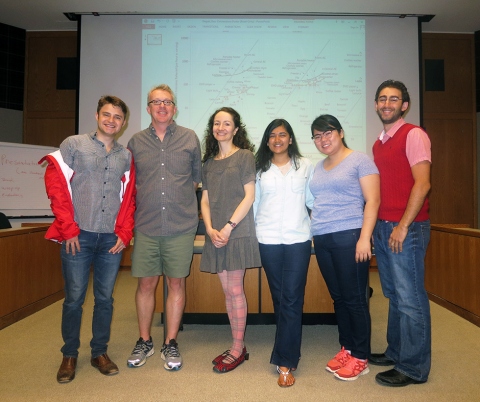Goals and Collective Efficacy: Routes to Energy Saving (2013-2014)
How do behavioral science considerations affect energy consumption decisions?
This project team conducted two sets of studies. First, does moral self-licensing extend into energy related decisions? The team explored the idea that, for sequential decisions, one "good" decision provides the license to make a "bad" decision (e.g., cycling to work “allows” you to drive more). The second study evaluated the “drop-in-the-bucket” effect on energy decisions (e.g., if an individual’s action appears to have no substantial effect in isolation, can a focus on collective outcomes encourage the person to take that action?). Team members gained experience in both the design and execution of behavioral science experiments, and went on to publish a paper in Nature Climate Change.
Timing
2013-2014
Team Outcomes
Adrian R. Camilleri, Richard P. Larrick, Shajuti Hossain, Dalia Patino-Echeverri. “Consumers Underestimate the Emissions Associated with Food but are Aided by Labels.” 2019. Nature Climate Change 9:53-58.
Adrian R. Camilleri. 2019. “People underestimate the environmental impact of their food choices.” Behavioural and Social Sciences at Nature Research.
Adrian R. Camilleri, Dalia Patino-Echeverri, Richard P. Larrick. 2019. “What’s your beef? How ‘carbon labels’ can steer us towards environmentally friendly food choices.” The Conversation.
Goals and Collective Efficacy: Routes to Energy Saving (poster by Adrian Camilleri, Richard Larrick, Dalia Patino-Echeverri, Gavan Fitzsimons, Gabriel Goffman, Shajuti Hossain, Marie Komori)
Dalia Patino-Echeverri. DMUU: Center on Climate Decision Making ($54,080 awarded from Carnegie Mellon University, 2010)
Videos
Underestimating Food’s Carbon Footprint
Energy Research Workshop 2014: Bass Connections in Energy Projects
Reflections
Can Pro-environmental Behavior Produce a “License” to Pollute?
Would Energy Labeling on Food Products Be Effective?
What Is the Best Way to Present Savings Information Produced by “Efficient” Actions?
Are People Well Calibrated When It Comes to Emissions from Appliance Use and Food Consumption?
Are More Arguments Always Better?
This Team in the News
How Our Food Choices Impact the Environment
Duke Fuqua Insights: Underestimating Food’s Carbon Footprint
Understanding Food’s Carbon Footprint
People Underestimate the Environmental Impact of Their Food Choices

Team Leaders
- William Chameides, Nicholas School of the Environment-Earth and Climate Sciences
- Gavan Fitzsimons, Fuqua School of Business
- Richard Larrick, Fuqua School of Business
- Dalia Patino Echeverri, Nicholas School of the Environment-Environmental Sciences and Policy
/graduate Team Members
-
Gabriel Goffman, Master of Environmental Management, Energy and Environment
/undergraduate Team Members
-
Shajuti Hossain, Economics (BS), Public Policy Studies (AB2)
-
Marie Komori, Psychology (AB)
/yfaculty/staff Team Members
-
Adrian Camilleri, Fuqua School of Business
